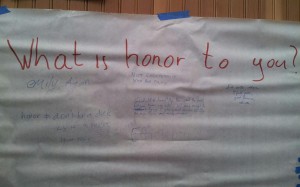In my short year at Reed, and during the antsy eight months beforehand as a wide-eyed Preedie, I’ve constantly obsessed over the Honor Principle’s role in my relations with other people, other groups on campus, and the community as a whole. During this time, I’d always had a clear-cut definition of what the Honor Principle is to me, which went something like “Do no harm to other people.” Gradually, this stance evolved into “In all actions, make sure your impact on the community is good,” which made me think more critically about my actions and how I can be a more positive person. My definitions have always been short, since I wanted to allow “wiggle room” if the situation needs it.
My relationship with the Honor Principle has been incredibly important in shaping my personality and the way I act, and it’s helped me directly deal with less-than-ideal situations. Consequently, when I joined Honor Council and started to get acquainted with the group, naïve me started to think I had the Honor Principle figured out, and that I had a permanent definition I could use to guide me for the rest of Reed (and, on a lesser level, my life).
Casual, obvious foreshadowing in the last paragraph suggests that’s not the case. Instead of resting comfortably in my definition of honor, I was confronted with a facet of honor I’d never thought of before.
My transition to college was marred by a lot of huge personal, familial issues that I had to overcome while immersing myself in this stressful ~~$^*LifeOfTheMind™*^$~~, and it hasn’t been an easy road. Breakdowns were often, and second semester was a challenge. Throughout this, I managed to still follow what I considered to be “honorable” behavior by helping others when I could, and keeping an outward appearance of cheerfulness (which, for the most part, was genuine). Even though most of the time I was doing great, when I was doing badly, I was doing very badly.
Around this same time, I overheard someone’s definition of honor that was very different from what I had. “Treat others and yourself as healthily and positively as you can,” was a large part of it that stuck with me. Before, I was only considering honor in relation to other people, forgetting the whole time that, in order to take care of others, I have to take care of myself in the process. I was exhausting myself to a point where I wasn’t enjoying my time at Reed, which is something I knew I could do with some life changes.
Over the following few months I would take many more steps to take care of myself (learning coping strategies, keeping a journal, getting enough sleep), in reaction to both increased personal stress and to this new outlook on the Honor Principle. Unfortunately, taking care of yourself can be harder than taking care of others in my experience, and it’s been a very time-consuming, energy-draining process. It hasn’t been perfect, but I’ve noticed improvement in my confidence, happiness, and self-esteem, and I’m very happy with where I am now. Not only am I happier, but I’m able to help everyone around me be happy much better than I used to.
I want to make clear that I’m not trying to be prescriptive about the definition of the Honor Principle; in many interpretations, honor isn’t a consideration when talking about your relationship with yourself, and for many people, given how Reed-specific it is, the Honor Principle solely governs community or interpersonal interactions. Each of these definitions (or lack of definitions for a lot of people) are completely good. Likewise, I know that taking care of yourself is super-mega difficult sometimes, and I don’t want to say that failing to take care of yourself is inherently dishonorable (because that’s kind of awful and prescriptive and not true). People have different ways to take care of themselves, and the Honor Principle as I applied it really helped me out. On this note, if you ever need to talk to anyone about something going on in your life, or a conflict with another person, or anything at all, Honor Council is here to help you, listen to you, and give you the resources you need. 🙂
I guess the point of this post is two-fold; I want to encourage people to rethink what contexts they apply the Honor Principle to, but, more importantly, I want you to know that it’s totally okay (and I’d say even great!) to have your definition of the Honor Principle change based on setting, life experience, personality, and whatever else is happening in your life. The beauty of the Honor Principle is how individual and communal it is at the same time, and it’s worth exploring both aspects when figuring out what “honor” is to you.

